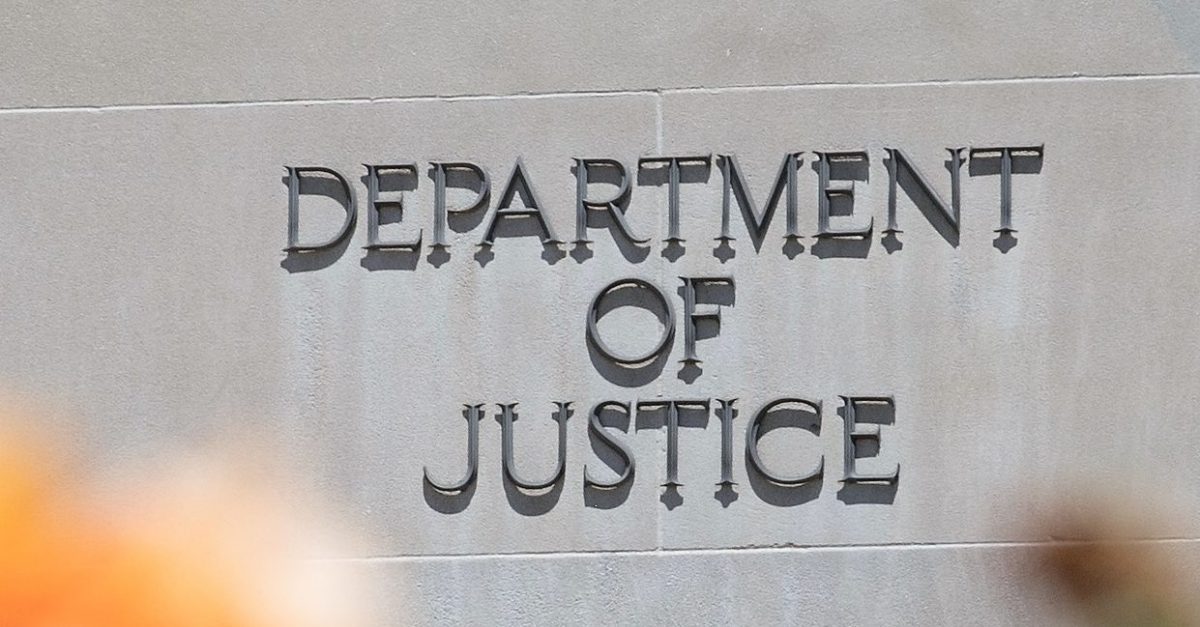
Our Justice Department just used its valuable, taxpayer-funded resources to stick its nose into a dispute between a gay Catholic school teacher and the Archdiocese that insisted he be fired. And guess whose side the government is helping out? The Archdiocese.
Apparently, our federal government is so worried that the Archdiocese of Indianapolis is going to be prevented from exercising its constitutional rights that it was compelled to submit a “Statement of Interest” detailing why it should be allowed to demand that Joshua Payne-Elliott be fired for exercising his.
If ever there were a defendant not in need of the DOJ’s assistance, it’s the Catholic Church. In running to the Indiana Archdiocese’s side, the federal government underscores the very point it so adamantly denies: maybe church and state are supposed to be separate, but they sure seem pretty mixed up right now.
Payne-Elliott has been a teacher at Cathedral High School since 2006. Archbishop Charles C. Thompson demanded a diocese-wide policy to demand termination of teachers in openly gay relationships. Following that mandate, leaders at Cathedral engaged in 22 months of talks before ultimately deciding to fire Payne-Elliott.
During those negotiations, the Archdiocese’s position was clear: either the school oust the gay teacher, or it forfeit its designation as “Catholic.” Ultimately, faced with the consequence of losing its non-profit status, the school opted to protect itself rather than protect an employee who was “living in contradiction to Catholic teaching on marriage.”
Payne-Elliott sued – but his claim wasn’t against the school for discrimination; rather, he brought a tort case against the Archdiocese seeking compensation for illegally interfering with his employment contract. to prevail, Payne-Elliott needs to prove both that the tort law applies to the Archdiocese, and that it actually violated that law by demanding he be fired.
Unsurprisingly, the Archdiocese’s response to Payne-Elliott’s lawsuit was a declaration of total impunity. According to the defendant, the American courts have no business interfering in “internal church matters.” Illogically, though, its argument rests on First Amendment grounds, which, according to the Archdiocese, guarantee it the right to disassociate with anyone it chooses.
Discrimination law and churches go together like peas and carrot cake; they’re related, but not in a way that makes anyone comfortable. Federal law prohibits discrimination on the basis of gender and sexual orientation (in addition to other categories) – but religious institutions can sometimes escape any requirement that they follow the law.
Whether a particular religious entity is legally permitted to discriminate against a particular LGBTQ person depends on the specific manner of discriminatory behavior as well as the jurisdiction in which the action occurred. Circuit courts have issued conflicting opinions, and there’s a whole lot of gray area in federal law. That uncertainty is likely why Payne-Elliot opted to focus this lawsuit on a tort claim. He is pursuing EEOC violations separately.
In his lawsuit, the plaintiff alleged that the Archdiocese had targeted LGBTQ employees and their families, and that the Archdiocese’s rationale for demanding his release was a pretext for discrimination. The Archdiocese contends that eliminating teachers like Payne-Elliott who conduct themselves “contrary to the teachings of the religion” is necessary for exercise of religious freedom.
Given that same-sex marriage is still relatively young, cases like Payne-Elliott’s are proceeding in a novel legal landscape. Balancing religious freedom with legal rights is a complex exercise, warranting tempered and judicious analysis. In its brief, the DOJ doesn’t lend a hand with that analysis – but rather, encourages our judiciary to simply opt out of it.
The government backs the Archdiocese’s position that the matter – wrongful termination – isn’t a civil legal matter at all, but rather, a “dispute over the Archdiocese’s application of Catholic law.” The statement goes on to characterize the lawsuit as overstepping the very authority of the archdiocese over Catholicism in general.
Another Indianapolis Catholic School — Brebeuf Jesuit Preparatory School — refused to comply with the Archdiocese’s demands, and retained a gay teacher. That teacher just happens to be Layton Payne-Elliott — Joshua’s husband. As promised, the Archdiocese of Indianapolis rescinded the school’s designation as a Catholic institution. In a move few saw coming, the Vatican intervened on the school’s behalf and suspended the Archdiocese’s decree pending the school’s appeal.
[Image via Alex Wroblewski/Getty Images]
This is an opinion piece. The views expressed in this article are those of just the author.